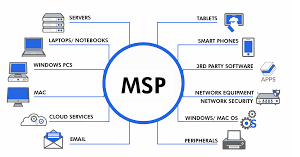In today’s digitally connected world, businesses rely heavily on technology to run their daily operations. From internal communication to customer relationship management, every aspect of modern business is powered by IT. However, managing complex IT infrastructure in-house can be costly, time-consuming, and risky. This is where Managed Service Providers (MSPs) step in.
An MSP is a third-party company that provides IT support, infrastructure management, cybersecurity, and more—tailored to your business needs. Through essential solutions like Data Cabling Services, Cloud Computing Services, and Outsourced IT Services, MSPs enable businesses to focus on growth while experts handle their technology.
What is an MSP?
A Managed Service Provider (MSP) delivers a range of IT services to businesses on a subscription or contract basis. Instead of hiring an in-house IT team, organizations partner with MSPs to manage and monitor their technology systems, ensuring everything runs smoothly, efficiently, and securely.
From small startups to large enterprises, MSPs cater to organizations looking to reduce costs, improve uptime, and access top-tier IT expertise without expanding their internal teams.
Key Services Offered by MSPs
1. Data Cabling Services
Proper network infrastructure is the foundation of a stable IT environment. MSPs offer Data Cabling Services to install, manage, and maintain structured cabling systems that connect your computers, servers, and other hardware. High-quality cabling ensures faster internet speeds, fewer disruptions, and the ability to scale your network as your business grows.
By relying on professional cabling services, businesses can eliminate bottlenecks, reduce signal interference, and ensure seamless communication between devices.
2. Cloud Computing Services
One of the biggest trends in IT today is the migration to cloud environments. MSPs provide comprehensive Cloud Computing Services that help businesses move from traditional hardware to cloud-based solutions such as AWS, Microsoft Azure, or Google Cloud. These services include:
- Cloud migration and deployment
- Cloud data storage and backup
- Disaster recovery solutions
- Cloud security and compliance
Cloud computing offers flexibility, scalability, and cost-efficiency. With an MSP’s expertise, businesses can access their data and applications from anywhere, ensuring business continuity and remote work capabilities.
3. Outsourced IT Services
Managing an internal IT department comes with high overhead costs. MSPs provide Outsourced IT Services to reduce this burden. From 24/7 helpdesk support and network monitoring to hardware maintenance and software updates, outsourcing IT needs ensures that businesses stay operational without interruptions.
Outsourced services also provide access to specialized talent, which is particularly beneficial for small businesses that can’t afford a full-time IT staff.
Top Benefits of Partnering with an MSP
✅ Cost Efficiency
One of the most significant advantages of hiring an MSP is cost savings. Companies pay a predictable monthly fee instead of investing heavily in hardware, software, and IT staff salaries. This subscription-based model allows for better budgeting and financial planning.
✅ Access to Expertise
MSPs are staffed with certified professionals skilled in various aspects of IT, from cybersecurity to cloud architecture. Businesses gain access to a pool of experts without the need to hire them individually.
✅ Enhanced Security
With cyber threats on the rise, cybersecurity has never been more important. MSPs implement proactive security measures such as firewalls, antivirus solutions, intrusion detection, and regular security audits to keep your systems safe.
✅ Proactive Monitoring and Support
MSPs offer 24/7 monitoring and support services to detect and fix problems before they escalate. This minimizes downtime, increases productivity, and ensures systems are always running at optimal performance.
✅ Scalability
As businesses grow, so do their technology needs. MSPs offer scalable solutions that adapt to your company’s changing requirements—whether you’re opening a new office or expanding your services online.
Industries That Rely on MSPs
Several industries depend on MSPs to manage their technology infrastructure. These include:
- Healthcare – for HIPAA compliance and secure patient data
- Finance – for data protection and transaction security
- Retail – for POS system support and network reliability
- Education – for online learning platforms and student data
- Legal – for document management and client confidentiality
MSP vs. Break-Fix: Why the Proactive Model Wins
Traditional IT support follows a break-fix model, where businesses call for help only when something breaks. This often leads to unpredictable costs and extended downtime.
MSPs, on the other hand, work on a proactive basis. They monitor systems, perform regular maintenance, and implement preventive measures to avoid issues in the first place. This approach saves time, money, and stress for business owners.
Choosing the Right MSP for Your Business
When evaluating MSPs, consider the following factors:
- Experience and Certifications – Ensure the provider has a proven track record and certified experts.
- Range of Services – Look for comprehensive services, including Data Cabling Services, Cloud Computing Services, and Outsourced IT Services.
- Service Level Agreements (SLAs) – Review their guarantees for response times, uptime, and performance.
- Customer Support – Choose an MSP that offers 24/7 support and personalized service.
- Scalability – Make sure their services can grow with your business.
Future Trends in Managed IT Services
As technology continues to evolve, so will the services offered by MSPs. Future trends include:
- AI and automation – Predictive analytics and automated responses for better performance and security.
- Zero Trust security models – Enhanced cybersecurity frameworks to prevent breaches.
- IoT device management – As businesses adopt smart devices, MSPs will provide integrated management solutions.
- Green IT practices – MSPs will play a role in helping businesses adopt sustainable technology practices.
Conclusion
A Managed Service Provider is more than just an IT vendor—they are a strategic partner that helps businesses navigate the ever-changing world of technology. With services like Data Cabling Services, Cloud Computing Services, and Outsourced IT Services, MSPs ensure your operations run smoothly, securely, and efficiently.
If your business is looking for reliable, scalable, and expert-driven IT solutions, it’s time to consider partnering with an MSP. Make the smart move today and focus on growing your business while the experts handle the tech.



































